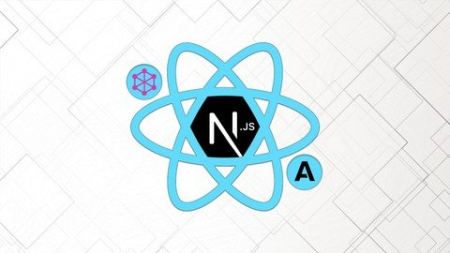
MP4 | Video: h264, 1280x720 | Audio: AAC, 44.1 KHz, 2 Ch
Genre: eLearning | Language: English | Duration: 157 lectures (28h 36m) | Size: 12.8 GB
Learn GraphQL and Apollo!
Create a fast portfolio application in Next.js(Next 9+) / React backed with Apollo + Node.js
Develop Real-world web application with Next JS, Apollo and Node
Create your own portfolio application in most demanded frameworks on the market
Grasp full power of GraphQL
Basics of React Framework!
Fundamentals in HTML and CSS, but isn't must have
What is GraphQL ?
GraphQL is a query language for your API, and a server-side run for executing queries by using a type system you define for your data. GraphQL isn't tied to any specific database or storage ee and is instead backed by your existing code and data.
What is Apollo ?
Apollo is the industry-standard GraphQL implementation, providing the data graph layer that connects modern apps to the cloud. Apollo will handle data fetching, caching and state management of out the box!
What is Next.js ?
Next.js is React framework that provides infrastructure and simple development experience for server side rendered(SSR) application.
An intuitive page-based routing system (with support for dynamic routes)
Pre-rendering, both static generation (SSG) and server-side rendering (SSR) are supported on a per-page basis
What are we going to build ?
We will work mainly on portfolios features. You will learn how to manage data on the client and the server with Apollo and Graphql. Data will be stored in Mongo Atlas Database to which we will be communicating through the Node JS Server. We will create a functionality to create a portfolio and I will explain you how to easily manage forms. Then we will take a look on an update functionality where I will show you how to populate inputs with existing data. After that will work on a delete functionality. All of the features will be reactive and updating view in real . You will learn the basics of data fetching and data mutations with Apollo.
Another big feature we will be working on will be session based authentication. We will prepare login and register forms. Users will be able to register, login and experience features only for authenticated users. You will learn how to manage sessions, how to protect the pages, and manage an authentication state through your application.
Forum feature will be the biggest one. You are going to learn how to create fully working forum consisting of topics and posts. We will integrate a component that will be used for topic and posts creation. Users will be able to create various topics, posts and also replies to other posts, all updated in real and also across the browsers. After that you will learn how to create a fully working pagination!
Later in the course we will create features to get randomised data for home page and I will talk about re-usability. We will finish CV page and we will get into deploying. After all production improvements will be applied we will deploy our application to heroku so anyone on internet can access our portfolio.
Starting as well as experienced developers interested in Next JS, GraphQL, Apollo
This course is for everyone eager to create apps with modern tech stack
DOWNLOAD
uploadgig
https://uploadgig.com/file/download/fe27dE514648f50f/AkltJxiY__Next.js_an.part01.rar
https://uploadgig.com/file/download/08ad99d813D37a06/AkltJxiY__Next.js_an.part02.rar
https://uploadgig.com/file/download/5634043a2BEfe412/AkltJxiY__Next.js_an.part03.rar
https://uploadgig.com/file/download/79eeb562a5a4F303/AkltJxiY__Next.js_an.part04.rar
https://uploadgig.com/file/download/18feA1a8432d4fB0/AkltJxiY__Next.js_an.part05.rar
https://uploadgig.com/file/download/A85318fcc17FE51e/AkltJxiY__Next.js_an.part06.rar
https://uploadgig.com/file/download/42893f7189d03d0f/AkltJxiY__Next.js_an.part07.rar
https://uploadgig.com/file/download/ffE38fea8Dc95d87/AkltJxiY__Next.js_an.part08.rar
https://uploadgig.com/file/download/BeAd21152d955024/AkltJxiY__Next.js_an.part09.rar
https://uploadgig.com/file/download/020F6e46Ca1E7f44/AkltJxiY__Next.js_an.part10.rar
https://uploadgig.com/file/download/Ac71cfbd4b711f28/AkltJxiY__Next.js_an.part11.rar
https://uploadgig.com/file/download/82382415898Db509/AkltJxiY__Next.js_an.part12.rar
https://uploadgig.com/file/download/98F83310f8dfa015/AkltJxiY__Next.js_an.part13.rar
https://uploadgig.com/file/download/afBf5705e53D8c15/AkltJxiY__Next.js_an.part14.rar
rapidgator
https://rapidgator.net/file/98bc8938bc0b2ef82cb4cd22b8f23bf0/AkltJxiY__Next.js_an.part01.rar
https://rapidgator.net/file/88c830178feb8def8dd84766d21f3a65/AkltJxiY__Next.js_an.part02.rar
https://rapidgator.net/file/a6568c7b594018a947173ad77c7a1374/AkltJxiY__Next.js_an.part03.rar
https://rapidgator.net/file/63c51e86600a04e4afaf62d2e3b53dc3/AkltJxiY__Next.js_an.part04.rar
https://rapidgator.net/file/38181f450b36731686e5a68b24edf310/AkltJxiY__Next.js_an.part05.rar
https://rapidgator.net/file/972bfaf2fe3c0917c470c4da043d6911/AkltJxiY__Next.js_an.part06.rar
https://rapidgator.net/file/c77c9cb6ccfaf05fcf237b5ff8419e03/AkltJxiY__Next.js_an.part07.rar
https://rapidgator.net/file/bf3cc0e33e70c451eaf8cd01df6f79e3/AkltJxiY__Next.js_an.part08.rar
https://rapidgator.net/file/a05f6e918c80cc1225edce0c664e941a/AkltJxiY__Next.js_an.part09.rar
https://rapidgator.net/file/237675579e8556faa3ce302d958d588e/AkltJxiY__Next.js_an.part10.rar
https://rapidgator.net/file/c874e3de48a80bcbe79a0705c509bf44/AkltJxiY__Next.js_an.part11.rar
https://rapidgator.net/file/d9a9d97c076e50e5396bce619e655207/AkltJxiY__Next.js_an.part12.rar
https://rapidgator.net/file/3c84c2c0c05cf837183c8c76eca947d4/AkltJxiY__Next.js_an.part13.rar
https://rapidgator.net/file/6f0bef2dbdeb89fa0c6a067047d76c64/AkltJxiY__Next.js_an.part14.rar
nitroflare
http://nitroflare.com/view/BD86963BD6C5E8B/AkltJxiY__Next.js_an.part01.rar
http://nitroflare.com/view/197CD377E0E56AC/AkltJxiY__Next.js_an.part02.rar
http://nitroflare.com/view/2D1FBDD075CDBE3/AkltJxiY__Next.js_an.part03.rar
http://nitroflare.com/view/1A7C0D09C92C5CD/AkltJxiY__Next.js_an.part04.rar
http://nitroflare.com/view/62BF646559266F9/AkltJxiY__Next.js_an.part05.rar
http://nitroflare.com/view/CBABE1DF0E45462/AkltJxiY__Next.js_an.part06.rar
http://nitroflare.com/view/B087104D8178D9A/AkltJxiY__Next.js_an.part07.rar
http://nitroflare.com/view/2B3176BFEE39FBF/AkltJxiY__Next.js_an.part08.rar
http://nitroflare.com/view/BC77C2B7EF3006A/AkltJxiY__Next.js_an.part09.rar
http://nitroflare.com/view/52B732F1BDEE687/AkltJxiY__Next.js_an.part10.rar
http://nitroflare.com/view/22EA043FA9E16C0/AkltJxiY__Next.js_an.part11.rar
http://nitroflare.com/view/79CA388AFAC6EB4/AkltJxiY__Next.js_an.part12.rar
http://nitroflare.com/view/776F2D50114BD81/AkltJxiY__Next.js_an.part13.rar
http://nitroflare.com/view/38B51405A44591F/AkltJxiY__Next.js_an.part14.rar

